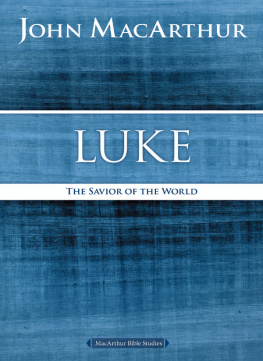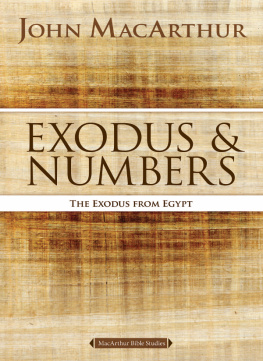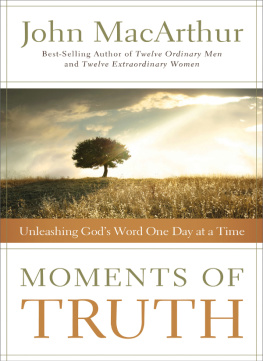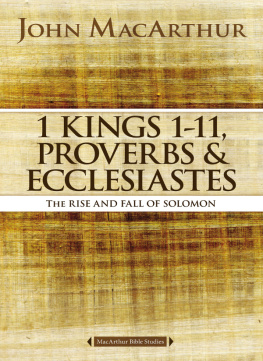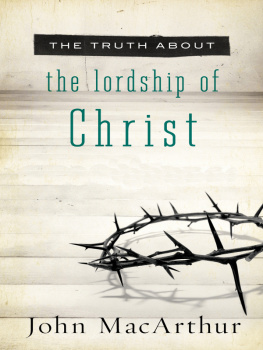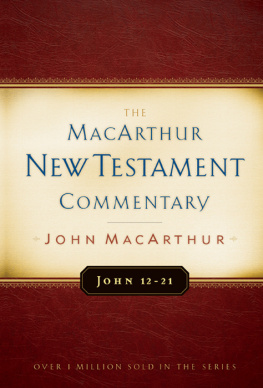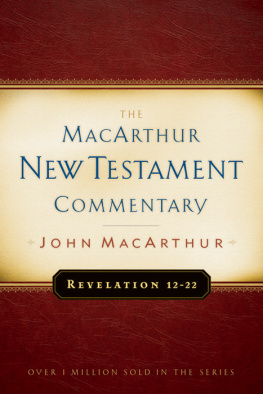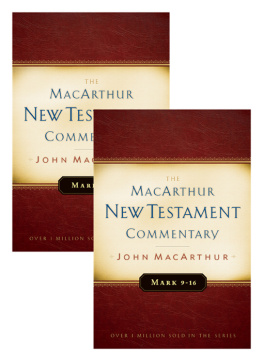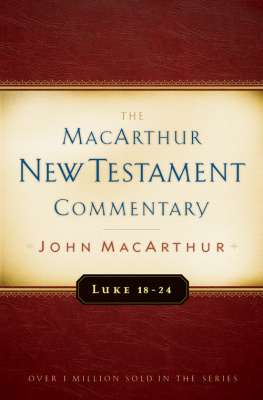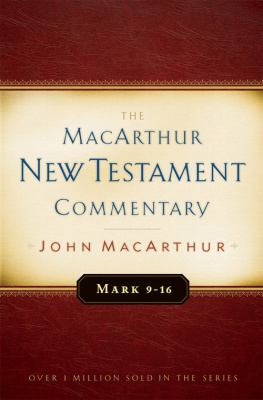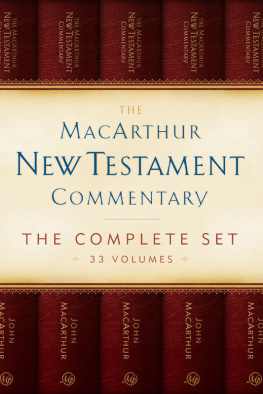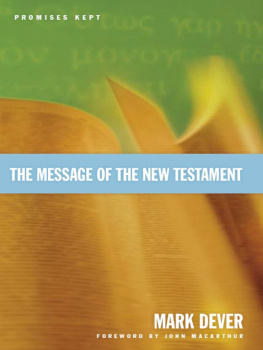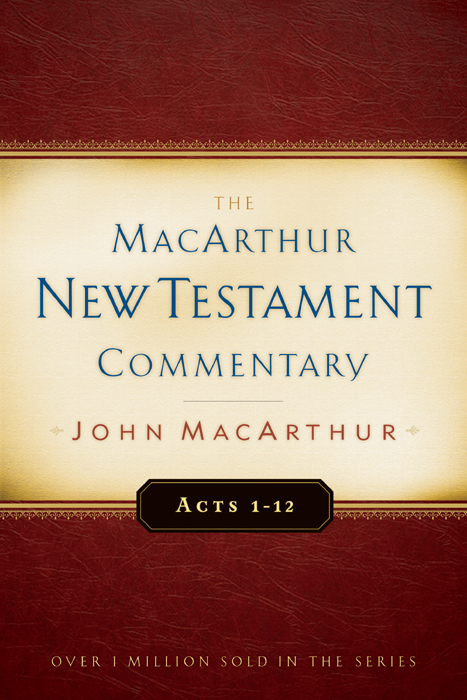The MacArthur
NEW TESTAMENT
COMMENTARY
ACTS 1-12

M OODY P UBLISHERS
C HICAGO
To Alistair Begg, with thanks
for loyal friendship
and kindred spirit
as we contend for the faith.
1994 by
J OHN M AC A RTHUR
All rights reserved. No part of this book may be reproduced in any form without permission in writing from the publisher, except in the case of brief quotations embodied in critical articles or reviews.
All Scripture quotations, unless indicated, are taken from the New American Standard Bible, 1960, 1962, 1963, 1968, 1971, 1972, 1973, 1975, and 1977 by The Lockman Foundation, La Habra, Calif. Used by permission.
Scripture quotations marked NIV are taken from the Holy Bible, New International Version. NIV. Copyright 1973, 1978, 1984 by International Bible Society. Used by permission of Zondervan. All rights reserved.
Scripture quotations marked KJV are taken from the King James Version.
ISBN: 0-8024-0759-5
ISBN-13: 978-0-8024-0759-7
We hope you enjoy this book from Moody Publishers. Our goal is to provide high-quality, thought-provoking books and products that connect truth to your real needs and challenges. For more information on other books and products written and produced from a biblical perspective, go to www.moodypublishers.com or write to:
Moody Publishers
820 N. LaSalle Boulevard
Chicago, IL 60610
13 15 17 19 20 18 16 14
Printed in the United States of America
Contents
The First Christian Sermonpart 1
The Introduction: Explaining Pentecost
The First Christian Sermonpart 2
The Theme: Proclaiming the Risen Lord
The First Christian Sermonpart 3
The Appeal and Results
Peters Powerful Sermonpart 1
Peter Preaches Christ
Peters Powerful Sermonpart 2
The Necessity of Repentance
Preface
It continues to be a rewarding divine communion for me to preach expositionally through the New Testament. My goal is always to have deep fellowship with the Lord in the understanding of His Word and out of that experience to explain to His people what a passage means. In the words of Nehemiah 8:8, I strive to give the sense of it so they may truly hear God speak and, in so doing, may respond to Him.
Obviously, Gods people need to understand Him, which demands knowing His Word of truth (2 Tim. 2:15) and allowing that Word to dwell in us richly (Col. 3:16). The dominant thrust of my ministry, therefore, is to help make Gods living Word alive to His people. It is a refreshing adventure.
This New Testament commentary series reflects this objective of explaining and applying Scripture. Some commentaries are primarily linguistic, others are mostly theological, and some are mainly homiletical. This one is basically explanatory, or expository. It is not linguistically technical, but deals with linguistics when this seems helpful to proper interpretation. It is not theologically expansive, but focuses on the major doctrines in each text and on how they relate to the whole of Scripture. It is not primarily homiletical, though each unit of thought is generally treated as one chapter, with a clear outline and logical flow of thought. Most truths are illustrated and applied with other Scripture. After establishing the context of a passage, I have tried to follow closely the writers development and reasoning.
My prayer is that each reader will fully understand what the Holy Spirit is saying through this part of His Word, so that His revelation may lodge in the minds of believers and bring greater obedience and faithfulnessto the glory of our great God.
Introduction
The book of Acts is the first volume of church history. It records the story of the church from its explosive beginning on the Day of Pentecost to the imprisonment at Rome of its greatest missionary. During those three decades, the church expanded from a small group of Jewish believers gathered in Jerusalem to embrace thousands in dozens of congregations throughout the Roman world. Acts describes how the Spirit of God superintended, controlled, and empowered the expansion of the church. Indeed, the book could well be called The Acts of the Holy Spirit Through the Apostles.
Acts is a significant book for several reasons. With the epistles, but without Acts, we would have much difficulty understanding the flow of the early history of the church. With it, we have a core history around which to assemble the data in the epistles, enriching our comprehension of them. The book follows first the ministry of Peter, then of Paul. From it we learn principles for discipling believers, building the church, and evangelizing the world.
Although a work of history, not theology, Acts nevertheless emphasizes the doctrinal truths concerning salvation. Jesus of Nazareth is boldly proclaimed as Israels long-awaited Messiah, and that truth is ably defended from the Old Testament (2:22ff.; 3:12ff.; 4:10ff.; 7:1ff.; 8:26ff.; 13:14ff.; cf. 9:22; 18:5, 2428; 28:23).
The book of Acts also teaches much about the Holy Spirit, who is mentioned more than fifty times. He regenerates, baptizes, fills, and sanctifies believers. The Holy Spirit is seen choosing missionaries (13:2) and directing their operations (8:29). He presided at the first church council (15:28) and, in short, directed and controlled all operations of the church.
The doctrinal importance of Acts is not limited, however, to its teaching on Jesus Christ and the Holy Spirit. While it does not flow around doctrinal issues, but historical events, it nevertheless touches many theological truths. Donald Guthrie aptly summarizes the theological significance of Acts: The importance of the book of Acts is in its preservation of the main doctrinal themes presented in apostolic preaching, even if there is no evidence of an attempt to develop a systematized theology (New Testament Introduction [Downers Grove, Ill.: InterVarsity, 1978],338).
A UTHOR
The unanimous testimony of the early church was that Luke, author of the gospel bearing his name, and the traveling companion and close friend of Paul, wrote Acts. In the second century, the anti-Marcionite prologue to Lukes gospel, the Muratorian Fragment (the earliest extant list of New Testament books), Irenaeus, Clement of Alexandria, and Tertullian all attest to Lukes authorship of Acts. Other church Fathers, such as Origen, Eusebius, and Jerome also attribute Acts to Luke.
The internal evidence for Lukes authorship is equally impressive. That the author of Acts was a traveling companion of the apostle Paul is clear from the so-called we passages (16:1017; 20:521:18; 27:128:16). In those passages, the writer switches to the first person plural, showing he was present. D. Edmond Hiebert summarizes the significance of that as it relates to the authorship of Acts:
References to various companions of Paul in these we-sections at once distinguish the author from other of Pauls close companions. Other well-known companions appearing in the Pauline epistles do not fit into the pattern set by these we-sections and can be located elsewhere at one time or another. Of the known close companions of Paul only Titus and Luke are never named in Acts. That Titus is not named is strange, but no one has ever seriously suggested that Titus was the author of Luke-Acts. This leaves only Luke as the probable author, and he is strongly supported by the external evidence. (



